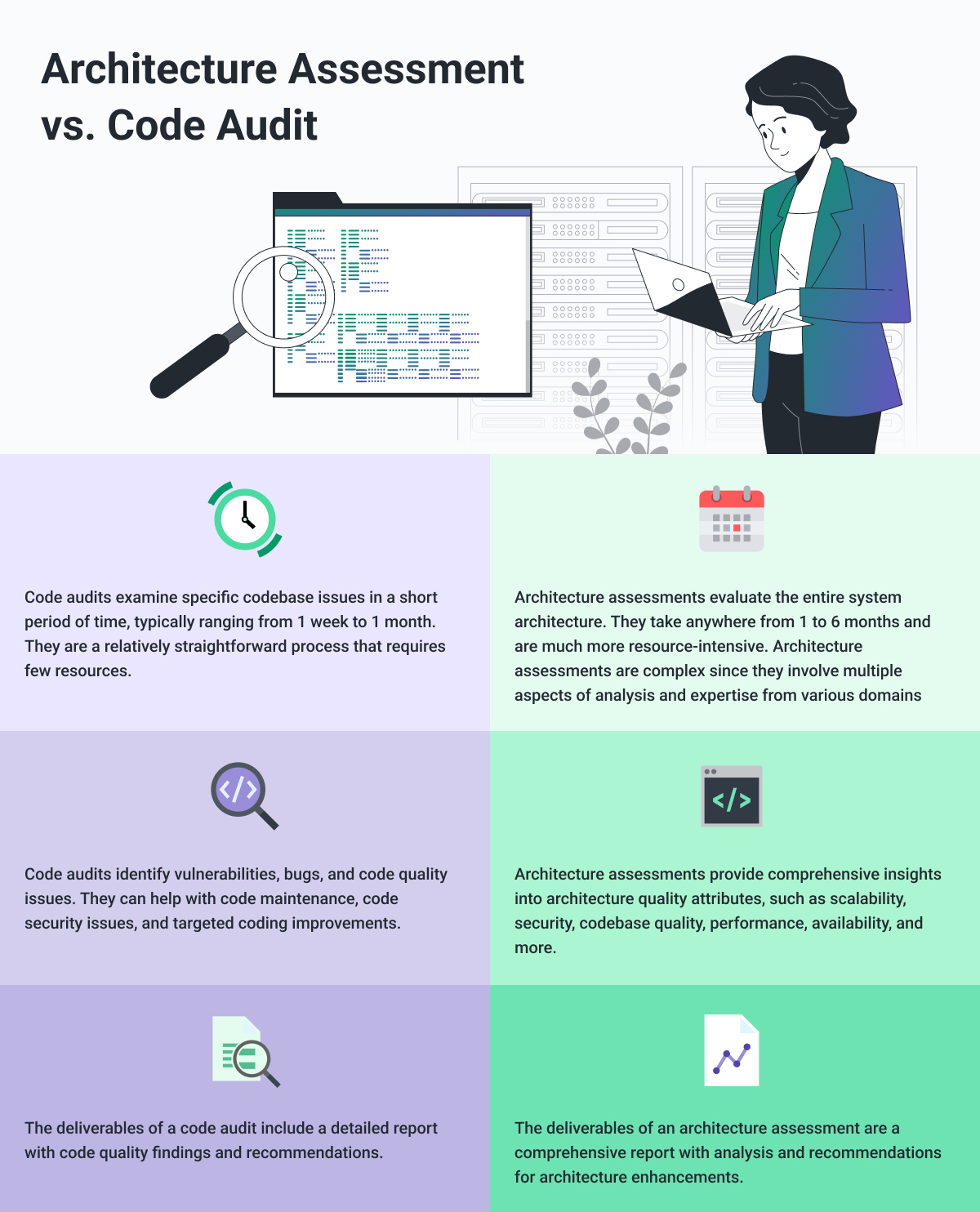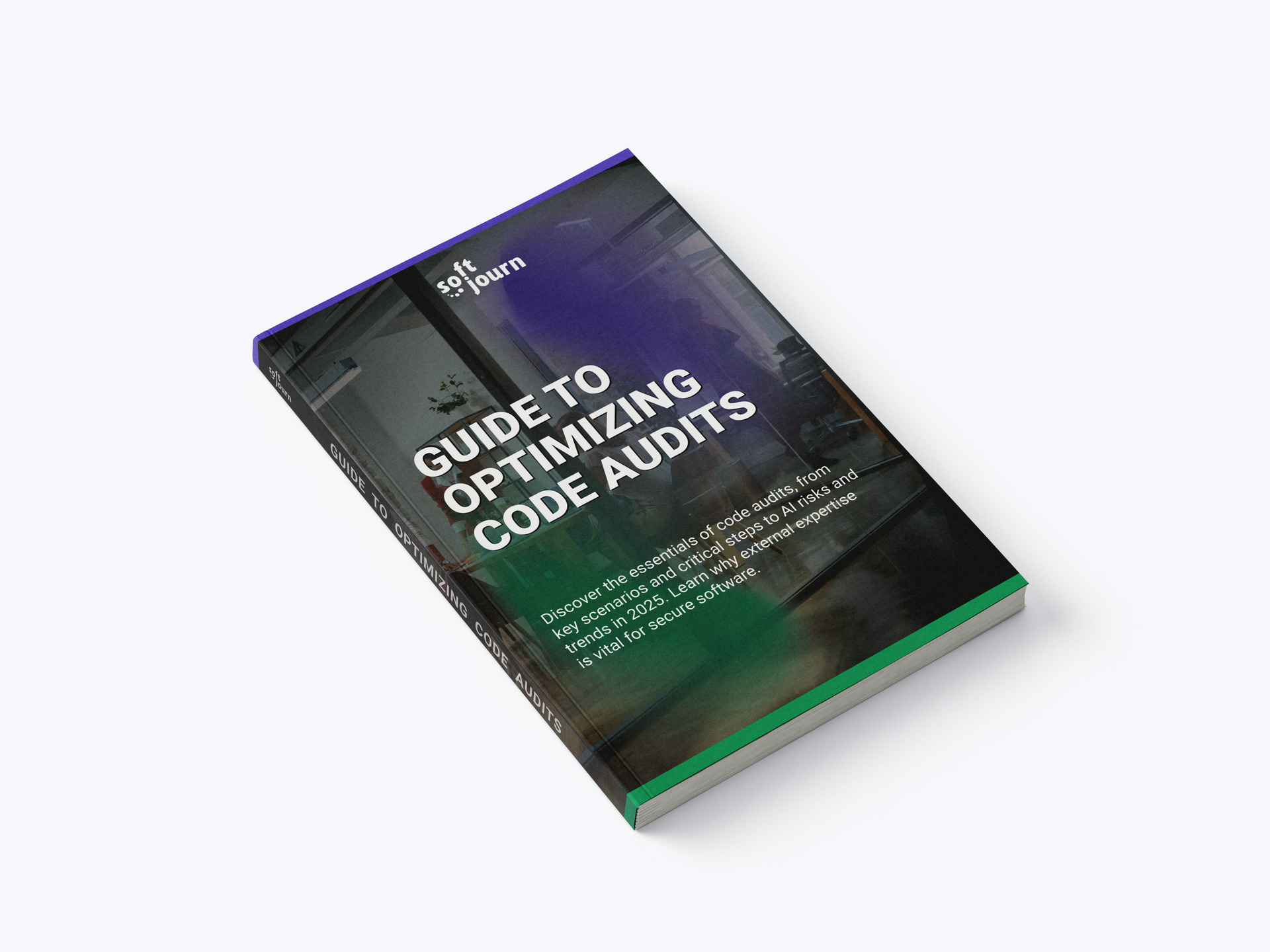In the world of software development and IT architecture, two essential processes are often employed to evaluate and enhance software systems: Code Audits and Software Architecture Assessments.
Although these terms are sometimes used interchangeably, they serve distinct purposes and offer unique benefits. In this guide, we will explore the differences between these two practices, their pros and cons, the processes involved, and how they can help organizations improve their software systems.
Understanding Code Audit Services
Code Audit Services are primarily focused on the examination of a software codebase to identify vulnerabilities, bugs, and code quality issues. These services involve in-depth analysis of the source code to pinpoint areas that need improvement.
Key aspects of code audits include:
Code Quality Assessment
- Identifying code smells, duplicate code, and unnecessary complexity.
- Evaluating code structure, maintainability, and adherence to best practices.
- Reviewing the quality of comments, coding standards, conventions, and consistency.
- Ensuring proper error handling, input validation, and sanitization.
Security Review
- Identifying potential security vulnerabilities.
- Analyzing access control mechanisms, authentication, and authorization processes.
- Evaluating data encryption and privacy measures.
- Conducting penetration testing to identify vulnerabilities.
Codebase Efficiency
- Assessing the effectiveness of coding techniques and algorithms.
- Reviewing the use of resources and optimizing where necessary.
- Ensuring that the codebase aligns with performance goals.
Maintenance and Refactoring
- Reviewing the code repository to assess codebase quality and structure.
- Evaluating the codebase for maintainability and modularity.
- Identifying areas for potential refactoring or improvement.
Audit Deliverables
Code audit services typically provide clients with a detailed report that includes findings, recommendations, and actionable steps to address the identified issues. These reports serve as a roadmap for improving the codebase's quality and security.

Exploring Software Architecture Assessment
In contrast, a Software Architecture Assessment takes a holistic approach, covering various aspects of the entire software system's architecture. This comprehensive evaluation goes beyond the codebase and encompasses the broader system architecture, including:
Scalability Assessment
- Assessing the system's ability to handle increased loads and growth.
- Identifying opportunities for horizontal and vertical scaling.
- Ensuring that the architecture supports scalability requirements.
Availability Assessment
- Analyzing the system's availability and downtime history.
- Reviewing disaster recovery plans and redundancy mechanisms.
- Examining the implementation of availability tactics.
- Security
- Performing a detailed security review to identify potential vulnerabilities.
- Analyzing access control mechanisms, authentication, and authorization processes.
- Evaluating data encryption and privacy measures.
- Conducting comprehensive security assessments, including penetration testing.
Performance Assessment
- Conducting load testing and performance testing.
- Reviewing response times, throughput, and resource utilization.
- Assessing the effectiveness of caching and performance-enhancing mechanisms.
Maintenance and Architecture Design
- Evaluating the overall architecture's maintainability and adaptability.
- Identifying opportunities for architectural improvements.
- Ensuring that the architecture aligns with best practices and industry standards.
Architecture Assessment Deliverables
Software architecture assessments result in comprehensive reports that provide a holistic view of the system's strengths and weaknesses. These reports include analysis, recommendations, and a strategic roadmap for optimizing the software architecture.

Code Audit Services vs. Architecture Assessment: Pros and Cons
Pros of Code Audit Services
- Short Timeline: Code audits can be completed relatively quickly, making them ideal for addressing immediate code quality concerns.
- Efficient Resource Usage: They require fewer resources compared to architecture assessments, resulting in lower costs.
- Focused Improvements: Code audits excel at identifying and addressing specific coding issues and inefficiencies within a code component.

Cons of Code Audit Services
- Limited Scope: Focuses solely on the codebase and may miss system-wide issues.
- Inability to Assess Architecture: Code audits are ill-suited for evaluating broader architecture, scalability, and security aspects.
- Limited in Evaluating System Attributes: They cannot comprehensively evaluate system-level quality attributes like scalability, security, and performance.
Pros of Architecture Assessment
- Maximum Value: Comprehensive assessment covers a wide range of critical aspects, providing holistic insights.
- Holistic Improvements: It allows for targeted improvements based on a holistic understanding of the system's architecture.
Cons of Architecture Assessment
- Complexity: It can be a complex process, involving expertise from various domains.
- Time-Consuming: The timeline varies significantly based on system complexity.
- Resource-Intensive: It often involves a team of experts, making it resource-intensive.
Comparison of Code Audits and Software Architecture Assessments.
| Aspect | Code Audits | Software Architecture Assessments |
| Scope | Examines specific codebase issues. | Evaluates entire system architecture. |
| Timeline | Relatively short, typically 1 week to 1 month. | Longer, ranging from 1 month to 6 months. |
| Resource Requirements | Requires fewer resources. | Resource-intensive, involves a multidisciplinary team. |
| Focus | Identifies vulnerabilities, bugs, and code quality issues. | Provides comprehensive insights into architecture quality attributes (e.g., scalability, security). |
| Targeted Improvements | Addresses specific coding issues. | Allows for holistic improvements based on a comprehensive understanding of the system. |
| Security Assessment | Identifies code vulnerabilities. | Conducts a detailed security review, including penetration testing. |
| Maintenance Insights | Identifies code maintenance needs. | Assesses architecture maintainability and modularity. |
| Scalability Evaluation | Doesn't assess scalability. | Assesses system's scalability for current and projected growth. |
| Performance Assessment | Doesn't focus on system-level performance. | Evaluates system performance, including load testing and response times. |
| Availability Analysis | Doesn't analyze system availability. | Reviews availability history and implements redundancy mechanisms. |
| Comprehensive Insights | Limited in evaluating system attributes. | Offers a comprehensive view of architecture and system attributes. |
| Complexity | Relatively straightforward process. | Can be complex, involving multiple aspects and expertise from various domains. |
| Deliverables | Provides a detailed report with code quality findings and recommendations. | Provides a comprehensive report with analysis and recommendations for architecture enhancements. |
Trusted by Top Companies
Softjourn has a proven track record of providing exceptional software consulting services, and we have been trusted by top companies across various industries. Our expertise and dedication to delivering actionable insights have helped organizations optimize their software systems, improve performance, and enhance security.
Improve Your Software Today
Both Code Audits and Software Architecture Assessments play crucial roles in ensuring the quality, security, and performance of software systems. While code audits focus on specific codebase issues, architecture assessments take a comprehensive approach, evaluating the entire system's architecture, scalability, security, and more.
At Softjourn, we offer both code audit services and comprehensive architecture assessments tailored to your organization's unique needs. Whether you need to address specific code quality concerns or gain a holistic view of your software architecture, we have the expertise and experience to guide you through the process.
If you're ready to improve your software system's performance and reliability, consider Softjourn as your trusted partner. To learn more about how we can assist your organization, contact us today.

Final Word
Understanding the differences between code audits and software architecture assessments is essential for organizations aiming to optimize their software systems. While code audits focus on specific code quality issues, architecture assessments take a broader approach, evaluating the entire system's architecture, scalability, security, and more.
Both are valuable tools in the software development lifecycle and choosing the right one depends on your organization's specific needs and goals.
Whether you require a quick code audit or a comprehensive architecture assessment, Softjourn's expertise and tailored services can help you achieve your software quality and performance objectives.















